- Home
- Cynthia Voigt
Come a Stranger Page 6
Come a Stranger Read online
Page 6
While the class was working at the barre, Mina moved to the center of the room, back at the far end, near where the changing room had been made catty-corner, where the clothes and bags were piled up against a wall. She worked adagio and allegro, then did batteries, increasing her elevation. Her muscles had to work hard because her body seemed to protest; and it wasn’t long before she was working up a sweat.
Miss LaValle changed the record, to Nutcracker selections, but Mina barely noticed. The record gave her rhythm for the two enchainements she had worked out, but it wasn’t music. As she went over the arrangements of steps, doing both completely each time, she tried to watch herself in the mirror. It didn’t feel quite right, but she couldn’t figure out what she was doing wrong. She was too often too close to off balance, she knew that. The steps in an enchainement were supposed to flow, one into the other, but hers didn’t feel like they were doing that. Mina concentrated hard, slowed down to regain fluidity of movement, then pushed up to the proper tempo. She heard Miss LaValle working with the class—the teacher was too patient, Mina thought. It was better to make the girls do more, work to higher standards, if you were going to teach them how to dance. Dance class shouldn’t be a social occasion.
There wasn’t anything more Miss LaValle could teach Mina; Mina had realized that right away. She continued coming for class time and giving Miss LaValle a five dollar bill at the end of each week. Mina had used to think that being a dance teacher like Miss LaValle would be a perfect life. You could dance all day long, if you wanted. Now, looking at her former teacher, she wondered. Miss LaValle’s dance slippers were scuffed and worn, she wore the same black leotard and tights Mina had always seen her wearing, and her hair wasn’t long. A dancer needed long hair. Mina was growing hers, which was a pain but was necessary. Miss LaValle kept hers short and curly, which looked good on her, but wasn’t what a dancer should do.
Miss LaValle was built like a dancer, long legs and muscular calves, a narrow torso, long arms and neck. Narrow shoulders. She had a flat stomach and small breasts. She looked weak and delicate, but she was actually strong.
There had been a time when Mina could imagine nothing more rewarding than living the kind of life Miss LaValle lived; now she could imagine more, so much more. . . . The bad side of that was that, now, she didn’t feel like she belonged even here, in the dance studio, anymore.
She was always feeling out of place these days, Mina realized. She thought of it during her silent walk back with Kat and again in her own kitchen, where Louis read at the table he’d have to set in a couple of minutes, once their mother got home. Mina had put the burner on under a stew and preheated the oven for biscuits. She had the biscuits mixed and shaped when her mother came in the door. “Go over to the church and tell your father his dinner will be on in—?”
“Twelve to fifteen minutes,” Mina said, slipping the two cookie pans into the oven.
“Take a jacket,” her mother called.
“It’s not far,” Mina called back. “I won’t be cold.” She didn’t take her jacket.
She went slowly down the front steps, rather enjoying the icy cold of the damp winter air on her bare arms and bare legs. From Miz Hunter’s porch came the question. “Where you going to, Missy?”
Mina halted in the concealing darkness. Miz Hunter probably stepped out onto her porch to say hello to Mina’s mother, coming back from work. Miz Hunter’s tiny body was silhouetted against the yellow light at the open front door.
“Where you going to, Missy?” Miz Hunter asked again.
I don’t know, Mina thought, and everybody’s getting in my way. Stop asking, she thought. “I’m going across to bring Dad home for supper,” she said.
“Well, you have a good evening.”
“You too,” Mina responded.
September, October, November, December—they were all gone and done with. January was almost over. It wasn’t that long now anymore.
CHAPTER 7
Mina’s heart was beating so fast, and so hard, she thought for sure it must show, thumping away under her blouse. Her father was driving slowly through the city of New London and then, slowly, up the river road. They had been riding for hours, without talking much, and Mina had made herself be patient. But now they were so close, and the car was going so slowly, waiting to turn and enter between the stone pillars and creeping up the road to the quadrangle.
When the car finally stopped, Mina burst out and took her suitcase from the backseat. Her father greeted Miss Maddinton. They talked about nothing in particular. Mina looked at her sneakers and felt her heart, beating.
It all soaked into her skin, and that was enough for now. If she looked around, at the stone buildings and trees, at all the familiar remembered places, she would start running around to touch everything, and her father would know—he’d know for sure what he’d only guessed, that she was gladder to be back at camp than anywhere else, that she could barely wait for him to leave so she could be by herself and be her own self again. She didn’t want to hurt her father’s feelings by letting him know that, so she stood there with her eyes closed, being there.
At last, he started to leave. “Have a good time, Mina.” He hugged her close and she hugged him back, her head almost up to his shoulder now. “Behave yourself.”
“I will. Have a good summer, Dad.”
She made herself stand and wave while the car drove away, a dusty black sedan with the Maryland license plate a little white square. Then she turned slowly around, and smiled.
“You’re in room three-o-seven,” Miss Maddinton said to her, consulting a list she had on her clipboard. She was wearing a silvery gray suit; her hair was in dark braids that she’d wound around her head like a corona. She looked busy, she looked distant and calm, she looked beautiful.
Mina was back where there was music around everywhere, every day. She was back where if you said Prokofiev, nobody said, “Who?”
“You’ve grown,” Miss Maddinton said, sounding doubtful, looking doubtful.
What did she expect Mina to do? Not grow? Mina laughed out loud. “I guess. My mom says I’ve been shooting up and shooting out.”
“You can find your own way, can’t you? I’ve got to greet the new girls.”
“Three-o-seven?” Mina asked, not that she didn’t remember, but just to savor this first minute a little longer. “Is Tansy here yet?”
“She’s up there,” Miss Maddinton said.
At that, Mina couldn’t wait another minute. She grabbed her suitcase and hurrying as fast as she could with the heavy case banging against her leg went into the dormitory, went home.
Room 307 was on the third floor. The second floor was for the littlest girls, the top floor for the fourteen year olds. Mina climbed two flights of stairs and pushed through the heavy door onto the corridor. She heard voices, she heard music. Looking at the numbers painted on the doors, she went on down the hall. Her feet wanted to jump and run, her heart wanted to stop it all from going by so fast already. Room 307 was down toward the far end of the corridor. The door was open, but no music came out. Mina guessed Tansy was probably in somebody else’s room, visiting.
But the room had only one bed in it. The room was too small for two beds anyway. The room was a single room.
Mina put her suitcase down on the floor and sat on the bed. For a long minute her mind was empty—blank and silent, a cold white emptiness. Then she understood.
They were seeing the outside of her.
Because nobody, not even Tansy, had wanted to be her roommate. So the adults had put her into a single room too.
Mina got up and set her suitcase on the bed. She unpacked her clothes into the dresser, then made up the bed and thought. She just hadn’t understood, she guessed; but as soon as she thought that she knew she was wrong. They had all been friends, they had all gotten along just fine. It was what her father had said, though, what he had noticed right away when he picked her up: She was the only little black girl there.
Mina laughed out loud and dropped the pillow on the bed. Little? Well, she wasn’t any too little anymore. There were bras and a box of Kotex she’d unpacked with the rest of her things. She guessed, if they thought she was little, in any way, they were underestimating her. She guessed she was going to have to make friends with them all over again. She stretched her arms out, her broad shoulders up, and flexed her fingers. She didn’t mind that. She always liked making friends.
The first thing that she wanted to do, now, had changed. Now the first thing she wanted to do was go outside and wander around a little. She wanted to have her bare feet on the grass that covered these hills. She wanted to put her palms up against the bark of the trees, to feel how strong and solid the trees were. She wanted to hear the way the wind blew through leafy branches, and she wanted to put her eyes once again on the gray stone buildings that looked like they had grown up out of the earth to make the college. Once she had touched all of those things, once she’d gotten back in touch with those things that didn’t look at her and see just the outside, Mina would come back inside and start dealing with the human things.
When Mina found Tansy, it was in a room with Isadora. They were sitting on their beds, not talking, not playing Tansy’s music, not doing anything. Tansy looked like her same mousy self. Isadora had grown up. You could see what she would look like when she finished growing, Mina thought; Isadora looked like a dancer.
Mina smiled and sat down and pretended she didn’t notice the quick, worried glance Isadora sent to Tansy. Last year, when she had been asleep to what was really going on, Mina had mostly caught only the ends of those looks and had been puzzled. Now that she was awake, she could see what they were. They separated her from everybody else, from everybody white. She thought she could show them that wasn’t necessary.
“Hey hi. It’s good to see you.” Because it was. “Isn’t it fun to be back? Have you seen Charlie?”
Isadora knew the answer to that. “She’s going to a drama camp, instead. Near Philadelphia. She said she’s gotten all ballet has to offer her.”
“Oh-ho,” Mina guessed without stopping to think, “and I bet we call her Charlotte from here on.”
Isadora looked up at her and laughed. “How’d you know? Honestly, Mina, you wouldn’t have believed it. She came, Charlotte, to spend the night, sometime in April. We’d planned it for ages, and then all she could talk about was this camp, and the opportunities it offered. She was like—she was like she was twenty-two and talking about her career. The first thing she said to me was exactly that: I had to call her Charlotte. How’d you know?”
“It was a guess.” Mina smiled another hello at Tansy, noticing for the first time what a shy smile Tansy had. Her mouth barely moved.
“And she was wearing stockings and three-inch heels to come spend the night.”
“You’ve got braces,” Mina said to Tansy, whose mouth was filled with silver metal. “Do they hurt?”
“A little.”
“I liked your Christmas card.” It had a picture of Tansy’s whole family on it, dressed up, standing in front of a big fireplace. Rich folks, Zandor had commented. “Your mother’s pretty.”
Tansy nodded.
“Have you made up any new dances?” Mina asked her. That got Tansy going, and Isadora drifted out of the room saying she’d be back to go down to dinner with them, so they should be sure to wait.
It didn’t take Mina long to figure it out. They didn’t mind being friends with her, but they didn’t want to be roommates. They thought she wouldn’t notice, as if she could be smart about other things but not about this. It was pretty funny, when she thought about it. Most of the time it was funny, she admitted to herself, alone in her room at night; sometimes, especially alone in her room, it felt like teeth biting into her heart. Like sharp pointed teeth biting into where her feelings were and cutting off bites to chew on. “But what did you think?” she asked herself at such times. “Didn’t you know you were black?”
She wasn’t going to let it trouble her.
What did trouble her was that for some reason the classes weren’t going right. Mina had worked hard to maintain her dance, harder than she’d ever worked at anything. But she seemed to have fallen behind even so. What used to be easy was hard now, as if she couldn’t do things everybody else could. Or as if her body couldn’t do what she wanted it to. When they had their dance classes, Mina would be distracted by the mirrors, because they reflected her blackness back and back, among the white skin of the other girls. That was the hardest place, the dance class, to remember not to see just the outside of herself, not to notice how different it was from everybody else. The other girls sat out in the sun to get tan, Mina thought; but she was darker than any of them, and it was funny that they didn’t see how funny that was. Mina felt trapped in her skin, locked in it, like a jail. She was always aware of being the only one.
Miss Maddinton didn’t seem to think anything was wrong, even when Mina found herself sweating after doing what should be simple floor exercises. Miss Maddinton never had any complaints about Mina. So Mina figured whatever felt so wrong was all in her own head. The theory class was still terrific, listening to different composers, learning about harmonics, watching Mr. Tattodine bounce around getting all excited about the music.
The first week of camp lasted about a hundred years. Mina never could relax, unless she was alone outside. Alone inside, she had to keep pushing back thoughts she didn’t want to face. With other people, she felt confused, trying to figure out what really was going on. They liked her, the other girls; they didn’t mind sitting with her at the table or anything like that, and they included her in the things they did, and they laughed when she was silly and listened to what she had to say. They talked to her. But Mina couldn’t tell if it was her, Mina, inside her skin, they liked, or if they were being nice to the one black girl at camp. If you were walking down a street and you saw somebody all crippled up and walking peculiarly, you’d go out of your way to show that it didn’t make any difference, to act natural and friendly, to smile and all that. You’d do it because you didn’t want the person to think you were thinking what you were thinking.
When they talked, nobody asked her questions. She asked them questions and they answered, as if they were the interesting ones and it was only natural that she should want to know more about them and that they shouldn’t be interested in knowing anything about her. So Mina was always listening to what was being talked about, trying to figure out what it really meant. There were also some things that never got mentioned, as if they weren’t visible. Like anything to do with black skin.
What did it all mean? When the questions crowded into her mind too closely, Mina would go outside, alone. She would sit back against a tree and close her eyes. She could feel the tree behind her, connected to its roots under the earth and growing straight up into the sky, strong. She could feel the ground under her legs, the grass-growing soil that covered the rocks that shaped the hills. Neither the trees nor the earth had any eyes to see what color she was.
In Narnia, Mina would want to be a dryad, a tree creature, with her roots dug into the earth and her body strong and lasting, untroubled by questions that blew through her like a wind blowing through branches. Trees were peaceful. They knew what was really true.
As soon as Mina thought that, however, and just when a smile was starting up in her heart and her whole body was relaxing against the grass and the tree, she would remember that dryads came from Greek mythology. They belonged to the white world. Then she would have to jump up with the feeling that jumped up inside her. Because they had so much, they had everything, and they kept reminding her that it wasn’t any of it hers.
Mina was so tired at the end of that first week of camp she didn’t think she’d ever have made it through without the company of the trees. The trees were stronger and older, wiser and truer too.
The second week was just about as bad. Mina was at ease only when she was alone, or during Mr. Tattodine�
��s class listening to music. She thought about how many of the instruments were made out of wood—violins and piano, cello, and the reeds, the oboe, the clarinet, the resonating bassoon. She picked out their individual voices as she listened. The Fourth of July came at the end of the second week. The girls at the camp had been invited to a big bicentennial display of fireworks over at the naval base across the river, so after supper that night they went to get dressed for the occasion. Mina, alone in her room, used the blow drier to make her shoulder length hair into a smooth pageboy. She got a little too much of the straightening gel into it, so it looked as if it had been lacquered into place, not soft the way it was supposed to. She didn’t have time to wash it out and redo it. She put on the dress Eleanor had made from a pattern Mina sent. It was a pale blue dress, with a sleeveless blouse top over an A-line skirt. Mina checked herself in the mirror, letting the noises from the other rooms slide in and out of her ears. Then she went to the window.
The sun was low in the sky, a heavy summer sun, sinking. There was no wind for a change, and the air lay heavy and gold. The trees stood patiently, enduring.
Mina closed her eyes. She wanted to be back with her own family, with her own people, at the annual Fourth of July church picnic. They didn’t have fireworks, except for a few sparklers for the little children, but they had fried chicken and potato salad and singing. There were three or four churches that got together for the occasion, a big, noisy crowd of people. The stars were fireworks enough. Mina didn’t think fireworks were so special. Right now, she could almost see the long tables set out, covered with food, and hear the people talking. She wished she was there where she wasn’t pretending every waking hour not to be different, pretending she was something she wasn’t, acting as if she wanted to be white.

 The Runner
The Runner By Any Name
By Any Name Bad Girls, Bad Girls, Whatcha Gonna Do?
Bad Girls, Bad Girls, Whatcha Gonna Do?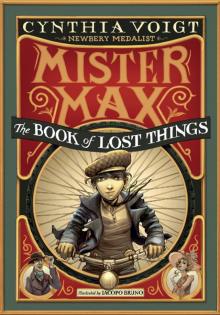 Mister Max: The Book of Lost Things: Mister Max 1
Mister Max: The Book of Lost Things: Mister Max 1 The Wings of a Falcon
The Wings of a Falcon Bad Girls in Love
Bad Girls in Love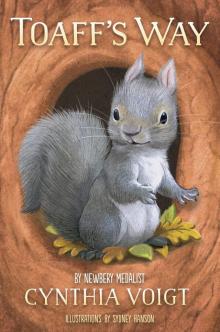 Toaff's Way
Toaff's Way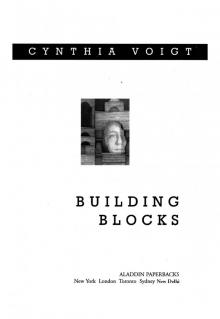 Building Blocks
Building Blocks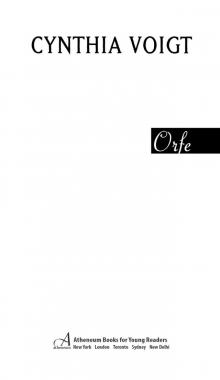 Orfe
Orfe Tell Me if the Lovers Are Losers
Tell Me if the Lovers Are Losers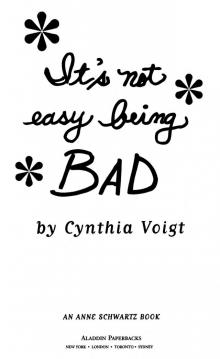 It's Not Easy Being Bad
It's Not Easy Being Bad The Book of Kings
The Book of Kings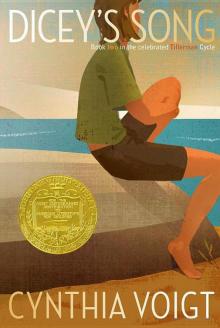 Dicey's Song
Dicey's Song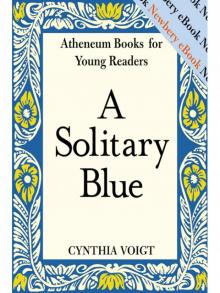 A Solitary Blue
A Solitary Blue Tree by Leaf
Tree by Leaf Sons From Afar
Sons From Afar Teddy & Co.
Teddy & Co. Jackaroo
Jackaroo Elske
Elske Izzy, Willy-Nilly
Izzy, Willy-Nilly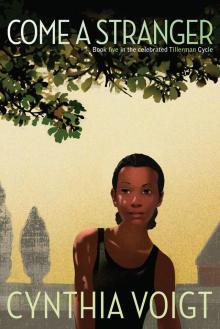 Come a Stranger
Come a Stranger Mister Max: The Book of Secrets: Mister Max 2
Mister Max: The Book of Secrets: Mister Max 2 Seventeen Against the Dealer
Seventeen Against the Dealer The Callender Papers
The Callender Papers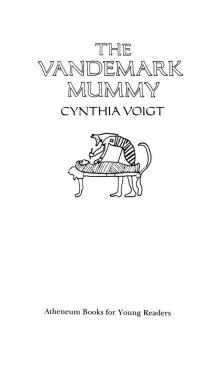 The Vandemark Mummy
The Vandemark Mummy Tale of Birle
Tale of Birle Glass Mountain
Glass Mountain The Tale of Oriel
The Tale of Oriel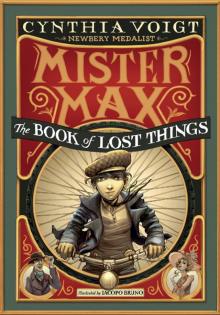 The Book of Lost Things
The Book of Lost Things The Book of Secrets
The Book of Secrets Tale of Gwyn
Tale of Gwyn